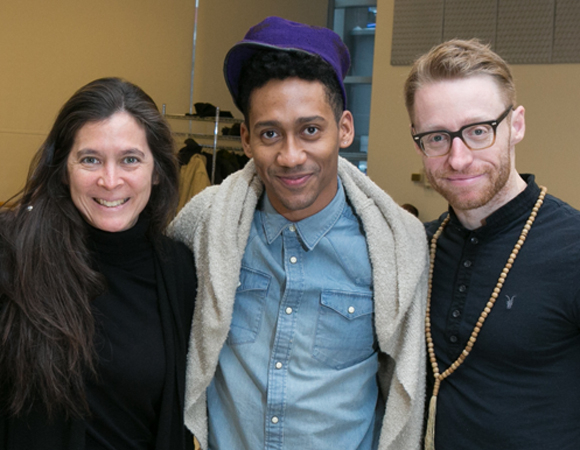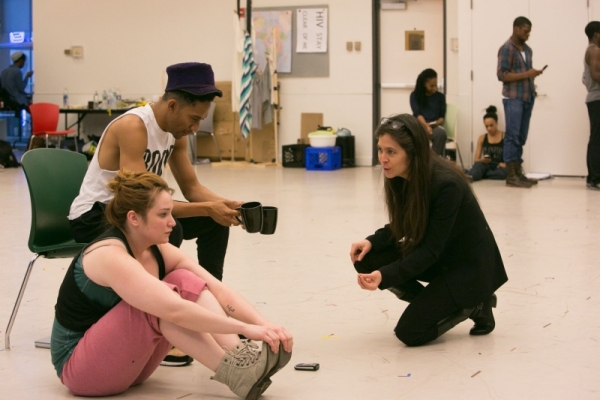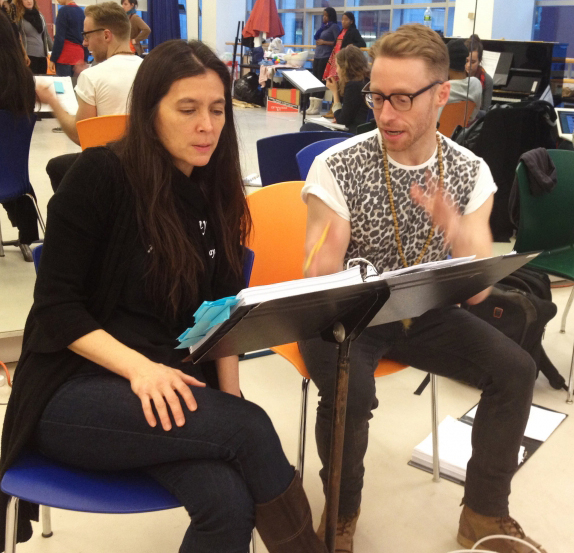Witness Uganda: Transforming African Aid Work Into A.R.T.

(© Jimmy Ryan)
American Repertory Theater Artistic Director Diane Paulus was in Cambridge, Massachusetts working on her circus-inspired revival of Stephen Schwartz's Pippin — the production that would later earn her a 2013 Tony Award — when Witness Uganda, a semi-autobiographical musical by young writers Griffin Matthews and Matt Gould, first came across her desk. After a second glance, however, she realized that she had crossed paths with the Africa-inspired piece more than once before.
Witness Uganda was brought to her attention several years ago during a meeting with Stephen Schwartz — though at the time, Paulus had her sights set firmly elsewhere. "I really wanted to do Pippin and it turned out that Stephen had a project he was championing [that he thought] would be great at the A.R.T"." Schwartz' project was a musical called The Blue Flower, which came to A.R.T. in 2010. However, during this early meeting, as Paulus desperately tried to steer the conversation toward Pippin, Schwartz offhandedly said, "There's this other show that one day you've got to take a look at it — it's a show about this guy who goes to Uganda."
"This guy who goes to Uganda" turned out to be a character both penned by and based on the experiences of Griffin Matthews, an actor who, it turns out, Paulus had cast in a show soon after he arrived in New York fresh from Carnegie Mellon. "I remember after that [show], losing track of him and always asking in casting sessions, 'what happened to Griffin Matthews?' I [heard] this buzz that he went to Africa [and that] he [wasn't] really in the business anymore," Paulus recalled. Quite the contrary, that trip to Africa would not be Matthews' farewell to the business, but rather an unorthodox key into the community he had only temporarily left behind.

(© Jimmy Ryan)
In 2005 Matthews took up some of his friends on an offer to join a volunteer mission trip to Uganda."I was really struggling to find my place and identity like a lot of people who are fresh out of college," Matthews said. "There were a lot of questions going on in my life." In an effort to answer some of them, the 23-year-old actor signed on to volunteer at a village orphanage in Uganda. However, upon arriving he discovered that the pastor overseeing the orphanage was embezzling funds", "so I walked out of the compound," he explained.
Now, roaming a Ugandan village with no purpose to speak of, Matthews was soon befriended by a group of local teenagers. "I sat on the floor with them and [asked], 'What are your dreams? What do you want to be when you grow up? What do you want to do?'" They unanimously replied, "We want to go to school."
Though 23-year-old Matthews did not have the disposable income to fund their schooling, he did have a college degree and time to spare, so he decided to start holding daily classes in the village library. The typical academic roster of reading, writing, and arithmetic, however, were replaced by lessons on self-esteem, public speaking, and HIV awareness. "Thus began Uganda Project, a nonprofit organization that Matthews launched when he returned to New York to raise money for his Ugandan tutees.
Yet it would be another three years before Matthews would write a musical piece about his experiences in Uganda. In fact, the original idea for the piece was proposed not by Matthews, but by Matt Gould, a composer and former Peace Corps volunteer who later joined the organization. Gould saw it as a potential fundraising tactic to save Uganda Project during the U.S. economic crisis in 2008. "The organization was going through a really hard time, [so I thought] well, why don't we write a musical piece about Uganda Project for a fundraiser?"
"I thought it was the worst idea I'd ever heard," Matthews laughingly interjected.
"And Griffin's usually right about most things," Gould jokingly added, "but this time I just had a sense that it could be interesting."

(© Kati Mitchell)
To prove that the idea had legs, Gould slyly pressed record on his Garage Band as Matthews vented his frustrations about this uphill climb the two of them were facing. "That night, I wove music through it, cut it up, put it together, and played it back for him the next day," said Gould. "We both listened to it and [knew] there's something here that felt right''."
When Witness Uganda finally penetrated Paulus' radar, it was not as a piece referred by Stephen Schwartz, nor as a show coauthored by one of her long-lost actors, but as the winner of the 2012 Richard Rodgers Award for Musical Theater. Its artistic value had been recognized by a jury of theatrical pioneers including Stephen Sondheim, John Guare, Sheldon Harnick, David Ives, Richard Maltby, Jr. Jeanine Tesori, and John Weidman — a group of artists who understand the challenge of jumping into uncharted theatrical waters — and won Tony Awards and Pulitzer Prizes for doing just that.
"When we started writing this people said, 'Nobody's going to want to see a musical about aid workers,'" Gould commented, reflecting on his five-year journey with Witness Uganda. "Stephen Sondheim has written about war; Richard Rodgers wrote about racism — the history of musical theater is rooted in epic human topics." Now, over a year into the developmental process, Paulus, Matthews, and Gould have worked to mine and purify this "epic human" core into a fully developed piece of theater.
"This piece is about the American impulse to make a difference in the world," Paulus remarked, "Even though [this impulse] is perhaps naïve and sometimes misguided, that doesn't mean that that it's not important or worthy or potentially impactful."
"Yes, there are no trapezes," she admitted for all of her Pippin fans, "[but] this subject matter is not told in the theater…and I think Witness Uganda gives people a really important forum — the artistic forum."











